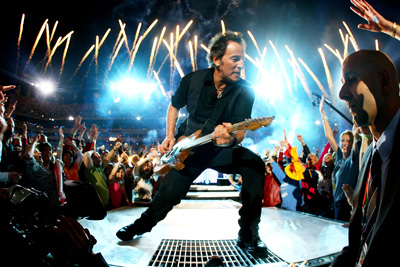
I’m not much of a music guy, but I like Bruce Springsteen. “He’s kind of sold out,” my wife — the former ’70s disc jockey — said to me the other day as I hoped the Cardinals and Steelers would use more running plays… the better to speed the clock along to Springsteen’s half-time show. Sell-out or not, I liked the show better than the first half of football.
Slate magazine, however, reminds me that I’m alone, so very alone. In “Bruce Springsteen misreads the national mood,” Stephen Metcalf paints an interesting proposition — that entertainment –at least in the person of Springsteen — isn’t mean to distract us from the ills of the day, it’s meant to reflect them.
The national mood is sober bordering on a galloping panic. Lively as he was, I wouldn’t say the Boss did much to either banish or capture it.
The Springsteen persona was originally intended as a stand-in for a blue-collar working class living in an insular white ethnic neighborhood and working a job on more or less permanent offer from an industrial economy. He was the poet of their decline, but he’s moved away from that specific community of origin as his persona has evolved into a bit of general-purpose kitsch Americana. Not coincidentally, Springsteen has flogged more and more a highly abstract idea of “community,” one centered around Bruce Springsteen. “It’s not just my creation at this point,” he recently told the New York Times, referring to the Springsteen iconography’s debt to its fans. “I wanted it to be our creation. Once you set that in motion, it’s a large community of people gathered around a core set of values.”
What?
It’s just a show, isn’t it? What is the role of entertainment when the national mood is depressed?
